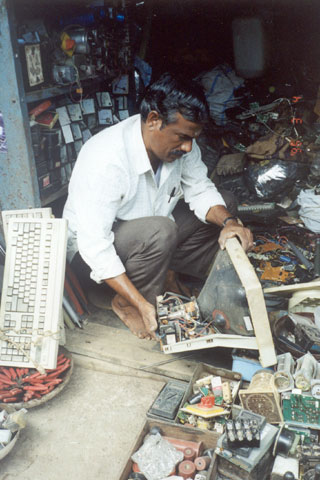| You are at Toxics Alert > News > Focus on electronic waste on World Environment Day | |||
 |
 |
||
|
Subscribe || Tell a Friend || Print View | ||
| Home | Editorial | Feature | Interview | News | Policy | Updates | Reports / International News | Partner | |||
|
|
Previous Article | Next Article Focus on electronic waste on World Environment DaySource: Toxics Link, Date: , 2007When global climate change seems to have drawn most of the attention on account of rising temperatures across the planet in the recent times, this World Environment Day, Toxics Link, called for an associated focus on the worsening challenge of electronic waste, particularly in India.
The NGO has carried out electronic waste assessment study in various cities in the country and highlighted its unsafe recycling of over a period of half-a-decade or so. The existing regulation Hazardous Waste (Management and Handling) Rules are inadequate for dealing with electronic waste as the nature of the waste generation in this case is spread across individual households and so is its recycling. This essentially means that a legislation that is meant for monitoring establishment would not work for e-waste. There is a need for a separate legislation on e-waste. Electronic waste is globally recognised as one of the fastest growing components of urban waste, and also considered a potent threat for the environment and people. As these products are made using metals and materials, which when dumped in landfills or broken down in a crude way, is introduced in air, water and soil as deadly heavy metals and lethal fumes. Information technology and telecom are the two fast growing industries in this country. India is expected to achieve a PC penetration rate of 65 per one thousand as against the existing rate of 14 per one thousand people by the year 2008. India at present has 15 million computers, which is likely to go up to 75 million by the year 2010, an almost five times growth over just next four years. "Toxics Link has in the past year initiated a dialogue on the possible management system, with a focus on the industry, through a suggested model based on the principle of Extended Producer Responsibility (EPR) and through formation of a not for profit organsiation as Producer Responsibility organisation (PRO). The PRO will directly involve industry players in the recovery, storage and recycling of e-waste. The model also highlights the need to build infrastructure and potential to attract capital investment in E-waste recycling," said Priti Mahesh, Senior Programme Officer, Toxics Link. |
•
Home •
FEATURE •
INTERVIEW •
NEWS •
POLICY •
UPDATES •
REPORTS / INTERNATIONAL NEWS •
 With India generating an approximate 1,45,000 tonnes of e-waste each year and almost all of it is being recycled in many poor urban locality, exposing people and environment to deadly toxins, it is indeed a grave challenge that is yet to be taken note of.
With India generating an approximate 1,45,000 tonnes of e-waste each year and almost all of it is being recycled in many poor urban locality, exposing people and environment to deadly toxins, it is indeed a grave challenge that is yet to be taken note of.